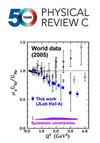Λnn的性质(Jπ= 1/2 + I = 1)和Λ3 h * (Jπ= 3/2 +,我= 0)
IF 3.4
2区 物理与天体物理
Q2 PHYSICS, NUCLEAR
引用次数: 1
摘要
在低能量$\mathrm{\ensuremath{\Lambda}}N$散射数据和超核三体和四体数据的约束下,在领先阶的无迹有效场论中研究了$\mathrm{\ensuremath{\Lambda}}nn$和$_{\mathrm{\ensuremath{\Lambda}}}^{3}\mathrm{H}^{*}({J}^{\ensuremath{\pi}}=3/{2}^{+},\phantom{\rule{4pt}{0ex}}I=0)$态的性质。采用随机变分法获得了约束态解,并采用耦合常数法中的逆解析延拓法和复标度法两种独立的方法研究了连续区域。我们的计算产生了$\mathrm{\ensuremath{\Lambda}}nn$和$_{\mathrm{\ensuremath{\Lambda}}}^{3}\mathrm{H}^{*}$未绑定状态。我们得出结论,激发态$_{\mathrm{\ensuremath{\Lambda}}}^{3}\mathrm{H}^{*}$是一个虚态,在复杂能量平面中,位于三体阈值附近的$\mathrm{\ensuremath{\Lambda}}nn$极点可以在一些考虑$\mathrm{\ensuremath{\Lambda}}N$的相互作用中转换为与$\mathrm{Re}(E)g0$的真实共振。最后,讨论了共振解的稳定性,并对计算精度的限制进行了评估。本文章由计算机程序翻译,如有差异,请以英文原文为准。
Nature of the
Λnn(Jπ=1/2+,
I=1)
and
Λ3H*(Jπ=3/2+,
I=0)
states
The nature of the $\mathrm{\ensuremath{\Lambda}}nn$ and $_{\mathrm{\ensuremath{\Lambda}}}^{3}\mathrm{H}^{*}({J}^{\ensuremath{\pi}}=3/{2}^{+},\phantom{\rule{4pt}{0ex}}I=0)$ states is investigated within a pionless effective field theory at leading order, constrained by the low-energy $\mathrm{\ensuremath{\Lambda}}N$ scattering data and hypernuclear three- and four-body data. Bound-state solutions are obtained using the stochastic variational method, and the continuum region is studied by employing two independent methods: the inverse analytic continuation in the coupling constant method and the complex scaling method. Our calculations yield both the $\mathrm{\ensuremath{\Lambda}}nn$ and $_{\mathrm{\ensuremath{\Lambda}}}^{3}\mathrm{H}^{*}$ states unbound. We conclude that the excited state $_{\mathrm{\ensuremath{\Lambda}}}^{3}\mathrm{H}^{*}$ is a virtual state and the $\mathrm{\ensuremath{\Lambda}}nn$ pole located close to the three-body threshold in a complex energy plane could convert to a true resonance with $\mathrm{Re}(E)g0$ for some considered $\mathrm{\ensuremath{\Lambda}}N$ interactions. Finally, the stability of resonance solutions is discussed and limits of the accuracy of performed calculations are assessed.
求助全文
通过发布文献求助,成功后即可免费获取论文全文。
去求助
来源期刊

Physical Review C
PHYSICS, NUCLEAR-
CiteScore
5.80
自引率
35.50%
发文量
863
期刊介绍:
Physical Review C (PRC) is a leading journal in theoretical and experimental nuclear physics, publishing more than two-thirds of the research literature in the field.
PRC covers experimental and theoretical results in all aspects of nuclear physics, including:
Nucleon-nucleon interaction, few-body systems
Nuclear structure
Nuclear reactions
Relativistic nuclear collisions
Hadronic physics and QCD
Electroweak interaction, symmetries
Nuclear astrophysics
 求助内容:
求助内容: 应助结果提醒方式:
应助结果提醒方式:


